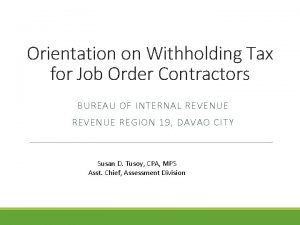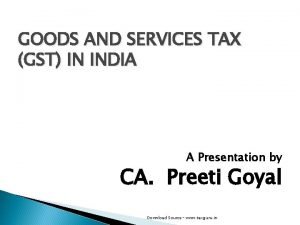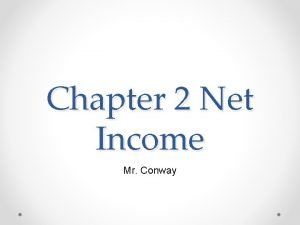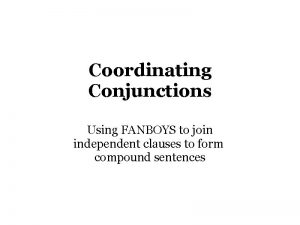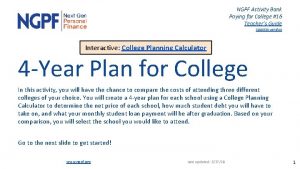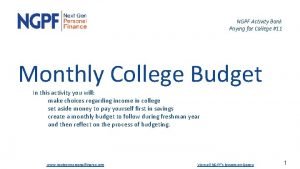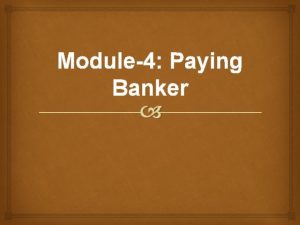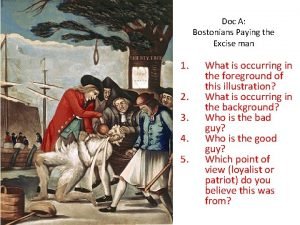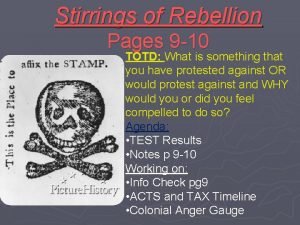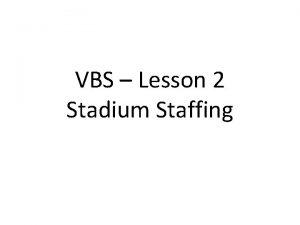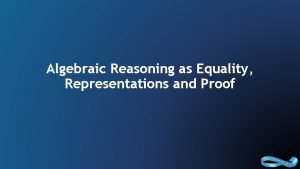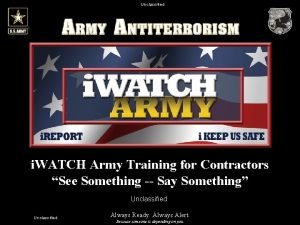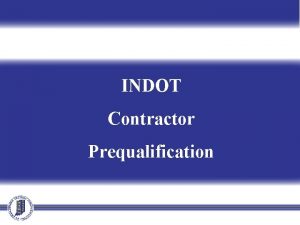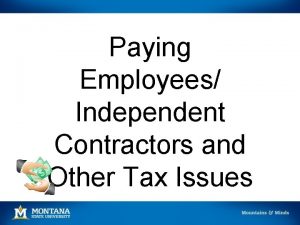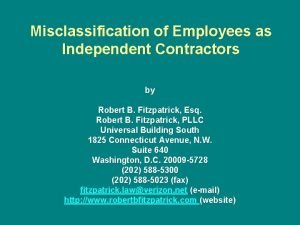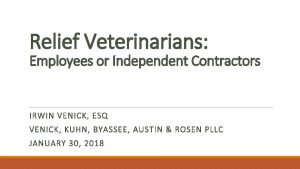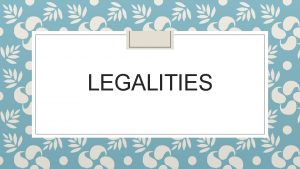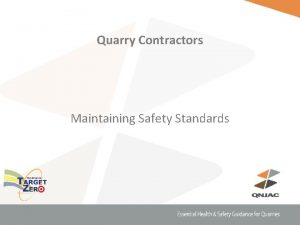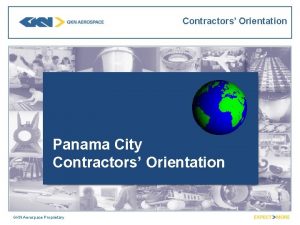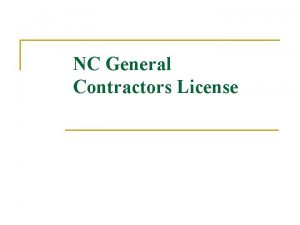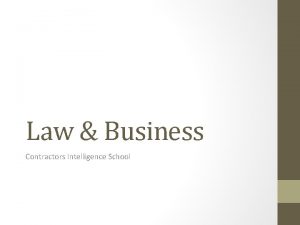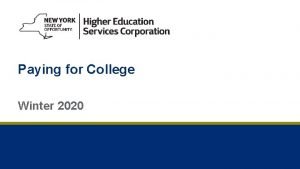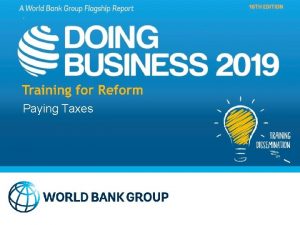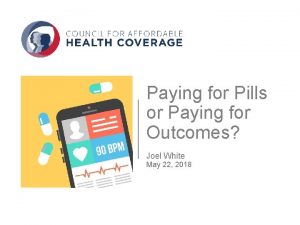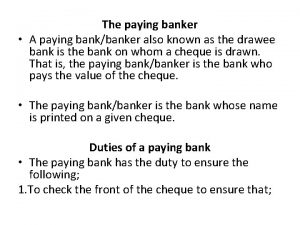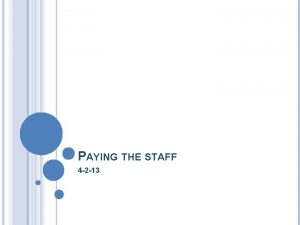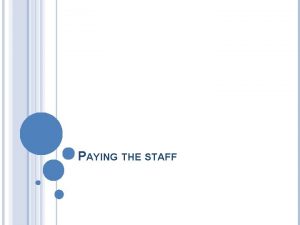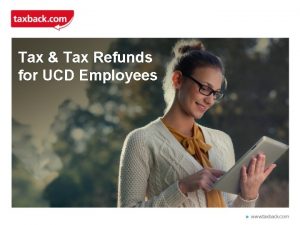Paying Employees Independent Contractors and Other Tax Issues




















- Slides: 20

Paying Employees/ Independent Contractors and Other Tax Issues


Independent Contractor vs. Employee 1. Behavioral Control a. Degree of direction and control b. How, when or where work is done c. Who provides tools or equipment 2. Financial Control a. Significant investment b. Opportunity for profit or loss 3. Relationship of Parties a. Part of MSU’s regular business/mission

8 Key Factors • Degree of control exercised by MSU over the details of the work • Which party invests in the facilities used by the worker • Opportunity of the worker for profit or loss • Whether MSU can discharge to individual • Whether the work is an integral part of MSU’s regular business • Permanency of the relationship • Relationship the parties believe they were creating • Provision of employee benefits

If not determined an independent contractor, may need to follow: One-Time special payment procedures • Does not replace Additional Compensation procedures for Tenure Track Faculty or Full-time Professionals • Cannot be used for Classified employees • Use 4 ONEPY position number and ONEPAY title on LOA

r!1 MONTANA STATE UNIVERSITY D New Hir e (EPAF ne eded) Letter of Appointment 0 Professional □ Research Departmen t Use Only: Pr. E!p are d By and contact ph one fl: : c : EP AF Tran sa ction #: D New l. OA as of July 1 st with Change (EPAF needed) □ ) I HR Use-O nly: HR _ Provost VPR _ New LOA as of July 1 st no change (EPAF nor needed) □ No P re -Employment Background Ctileck reques ted? □ Yes □ No , cli ck here to request a backgroun d check: http: //WWW. montana. edul hr/Recruitment/professional/bground. html ( Date Name of Hire Address ) If a : >Qlicable, current information of Ex iring Letter of_A , o_in_tment: Start Date: Employee GID: End Date: Position Title: FTE: Position Number: Department/Office/College: Monthly Salary of $ FY □ Contract Term: AY □ !As of [Date]_, _you are hereb a ointed as follows: Employee G D I -: 0 0 0 0 0 , , -------, , , ' Position Title: ONEPAY Use this position ' on EPAF also ) Position Number: 40 NEPv----. . J, M onthly. Salaryo f: $totalamoun ; ', , _, Contract Term: AY □ FY □ Start Date: first of month End Date: last of month FTE: o Department/Office/College: Your job duties are to: [D escribe duties and any other unique conditions of employment] • MONTANA STATE UNIVERSITY Mountains & Minds

Complete and submit a “One time payment” EPAF

Curr ent Value New Value It em Job s Eff ective Dat e: MM/ DD /YYYY* 0 B/ 31 / 2013 Job Ch an ge Reaso n : * ( N o t Ent era ble ) ENDTM om f -- Job S t at u s: * (Not Ent era ble ) T D n. 1 • • = - - n 1■ - ■ 1. a. ppro vall Le vel l - - 99 - (ONEPY 2) One Time pay applier - r-N-o-t - - S-e--_ lec_t-_e d-- - I Not Selected __ No_t_ Se_-le_c_t_e d '"I INot Selected Required Action User Name 0 , __ 9_ 8_ ___(0_N_E_P_Y_l )_ O _n_e_ T _m i e _ _Pay - A_ pp-_r_ov_e r 1 -, -""1" 0. 0. MAXT FHARPEl. R '"l. : ]"" U. a_ - - - - _ M_Ia_x A_-a l _n__Ths_oo-n_m_p - - - -- - I Fiona Ann Harper IApprove l: =============; l _l'" I Appl y N_o_t_ S_e_e l _c_t_edl. . 1 - I: ====================== I!No. It Not Selected l. : ] INot Selected l. : ]U. [ Sa ve and Add New Ro ws Com ment Ple ase t y p e a brief description of services and reason for paym ent and if an LOA was sen t through for approvals. App ro val Types I Accoun t Distributi on I Ro uting Queue I Tran saction Hist ory • MONTANA STATE UNIVERSITY Mountains & Minds

Other Tax Issues – Fringe Benefits What are Fringe Benefits? • Cash, cash equivalents, property, services or other benefits provided to an employee by an employer or a third party in addition to regular salary. –Life, health and disability insurance –Education assistance –Club memberships –Gift certificates –Courtesy car –Tickets to entertainment events –Meals –Cell phone

Which Fringe Benefits are Taxable? • All fringe benefits are taxable unless specifically excluded by a provision of the Internal Revenue Code. • The fair market value of the benefit (i. e. , what a disinterested person would pay) is subject to withholding and reported as income on a W-2 in the year the benefit is received.

What Fringe Benefits are Excluded from Income? • Internal Revenue Code § 132(a) provides an exclusion from gross income for any fringe benefit which qualifies as a— (1) de minimis fringe (2) working condition fringe (3) no-additional-cost service (4) qualified transportation fringe (5) qualified employee discount; or (6) qualified moving expense reimbursement

What is Considered De Minimis? • IRS Regulations do not define ―De Minimis‖ • Other regulations permit a business gift of $25 or less to be given to a client, so some use $25 as a limit • The IRS Auditor’s Fringe Benefit Guide discusses that $100 is NOT de minimis • So, between $25 and $100 is risky, but there is no clear guidance.

Working Condition Fringe Benefit • Items that, had the employee paid for themselves would have been deductible on their tax return, are considered tax-free working condition fringe benefits because they are ordinary and necessary in the performance of duties (Publication 529) –Uniforms –Tools and equipment –Professional licenses –Travel expenses Examples: a carpenter’s saw, an accountant’s calculator, a police officer’s uniform

Clothing • To qualify for tax-free treatment, provision of clothing must either be de minimis or considered a working condition fringe • De minimis is something that occurs infrequently and is of low value. Remember-low value is not defined by the IRS • The staff each receive a shirt with the MSU logo, for example, Move-In Day vests

Clothing (continued) • The IRS auditor’s manual indicates that uniform allowances are taxable unless: – They are required to be worn for employment and – They are not suitable for everyday use • Clothing is always allowable if required for safety (goggles, harnesses, etc. )

Meals • Occasional meals can be excludable, if the following three conditions are met: –Meal is reasonable in value, and is not provided regularly or frequently, (i. e. , it is de minimis); and –Provided for Overtime Work -Overtime work necessitates an extension of the employee's normal work schedule; and –Enables Overtime Work -Provided to enable the employee to work overtime

Other Tax Issues – Gift Cards Non Employees: • $25 or less considered a ‘business gift’ Recipient must sign acknowledgement of receipt of gift card to support departmental purchase • Above $25? Employees: • All taxable, regardless of amount. Notify HR, so amount can be included in employee’s W 2 Recipient must sign acknowledgement of receipt of gift card to support departmental purchase

Other Tax Issues – Long Term Travel • Temporary Travel is defined as less than 1 year • Travel over 365 days is considered ‘indefinite’ and may be taxable • Contact UBS if you have someone expected to be in travel status over 1 year • Expenses are still reimbursable. Meals and lodging may be taxable.

Other Tax Issues – Donation of Award/Honorarium • Generally recipient must accept award/royalty/ honorarium and then donate it back to MSU • Direct transfer to MSU may be allowed if the following conditions are met: – No action was required by the recipient, i. e. enter contest, submission of paperwork, deliver presentation – Unexpected in nature, not payment for service – Not required to perform substantial future services • Contact UBS for specific IRS letter requirements

Important Contacts Laura Humberger, Associate VP Financial Services, 994 -4361 lhumberger@montana. edu Katie Matzinger, Director of Accounting, 994 -7508 Katie. Matzinger@montana. edu Max Thompson, HR, Payroll/Compliance Manager, 994 -3651 maxt@montana. edu Other/General UBS questions: Christina Fournier, UBS, Financial Manager, 994 -3653 Fournier@montana. edu or UBSHelp@montana. edu
 Job order tax
Job order tax Conclusion of gst
Conclusion of gst Ralphs annual income is about $32 000
Ralphs annual income is about $32 000 Two main clauses
Two main clauses The belief that others are paying more attention
The belief that others are paying more attention Art lovers can visit the - metropolitan museum of art.
Art lovers can visit the - metropolitan museum of art. Ngpf activity bank paying for college
Ngpf activity bank paying for college Ngpf activity bank paying for college
Ngpf activity bank paying for college If you're not confused you're not paying attention
If you're not confused you're not paying attention Paycheck
Paycheck Paying banker
Paying banker British mercantilism
British mercantilism The bostonians paying the excise-man
The bostonians paying the excise-man Rosa has decided to sell pet rocks
Rosa has decided to sell pet rocks Bostonians paying the excise man
Bostonians paying the excise man Stadium staffing simulation answers
Stadium staffing simulation answers Algebraic representation
Algebraic representation Army iwatch training
Army iwatch training Ikea flat roof system drain
Ikea flat roof system drain Introduction to property valuation
Introduction to property valuation Doing business with indot
Doing business with indot
